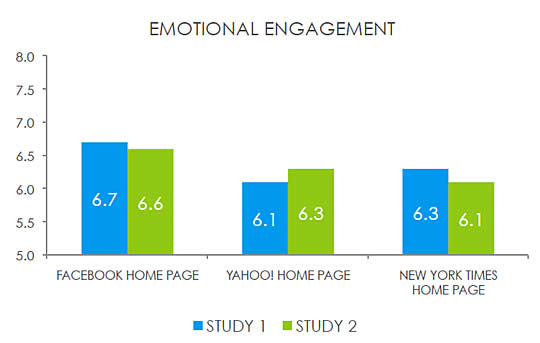Facebook Ads Most Engaging in Neuromarketing Study

Do Facebook ads get respect? Many of the ads I see are for cheesy sites and suspect offers. Web marketers I talk to all complain about low click-through rates on Facebook ads, and that matches my own experience. Facebook is determined to do a better job generating ad revenue, and hired neuromarketing firm NeuroFocus to study how users perceived ads on “premium” websites.
Since we are seeing the results of this study, astute readers will have guessed the outcome: ads on Facebook do very well compared to the competition.
Website Comparison
The study looked at three popular web destinations:
- A user’s own “News Feed” page on Facebook
- The default home page of Yahoo!
- The default home page of NYTimes.com
Separately, NeuroFocus determined that these sites all captured more of the viewers attention and were more engaging emotionally that “average” websites. The key finding from Facebook’s standpoint was,
People viewing their own “News Feed” page on Facebook exhibited high levels of activation on all three metrics: attention, emotional engagement, and memory. The Facebook page had statistically higher levels of emotional engagement than either of the other two pages tested.
 NeuroFocus uses an EEG device, Mynd, to measure brainwave activity as consumers view ads and other content. Their literature says that they turn the collected data into three key metrics: attention, emotional engagement, and memory retention.
NeuroFocus uses an EEG device, Mynd, to measure brainwave activity as consumers view ads and other content. Their literature says that they turn the collected data into three key metrics: attention, emotional engagement, and memory retention.
Should we be surprised by the results? One might expect that a social network like Facebook, where we interact with friends and family, might be more emotionally engaging than a news site or web portal. Still, the data is interesting, and, if you read the whole report, you’ll see it isn’t universally favorable to Facebook. The published study also provides a relatively uncommon glimpse into the sort of neuromarketing study results that are normally kept confidential. And, if the NeuroFocus study gets some quality ads on Facebook to replace “women looking for mature men” and phony “Lord & Lady Titles,” I’m all for it!

As you say Roger, surprising to see FB ads getting such a positive response. They are always so poorly targeted.
The thing that jumped out for me in the full report, was actually one of the first lines:
“Compared to NeuroFocus norms, “premium websites” such as Facebook, Yahoo, and the New York Times deliver substantially more engaging experiences than the average website.”
From my viewpoint, these 3 sites are large recognizable brands with an established authority/trust level with users. I’d have thought the level of brand recognition naturally increased user trust in the ads or onsite promotions being offered.
I know the report defines ‘premium’ based on solid metrics (pg 7 – ..define “premium websites” as those that score above 6.0 on overall effectiveness…) but I’d have thought a study of effectiveness based on a websites brand recognition might have had more impact.
Hard to say, Rod. A site like this one may have little overall brand recognition but be quite engaging for the people who frequent it. Another issue is the engagement of the site vs. engagement with ads – I’ve always attributed the low CTR on Facebook to the fact that users are engaged with the content and not looking for products or services (unlike, say, search ads).
Roger
Hi Roger –
Just to clarify, I don’t think NeuroFocus is using the MYND product in studies at this point. I believe that the one unit they have is mostly for show-n-tell at Dr. Pradeep’s presentations and not for daily use in studies. Last I heard, all their studies were still using the EEG cap with standard “wet” gel and the BioSemi amplifiers (the same method and type of equipment as 99% of EEG researchers and clinicians). This is also the method & equipment that was used to populate their database of neurologicial responses.
The quality and reliability of the EEG signal data collected using dry electrode type systems like the MYND (and the now departed Emsense Emband) are very questionable and is not a generally accepted tool for good EEG recordings.
I could be mistaken but I do not believe the MYND was used in the Facebook sponsored study (or I assume the White Paper would have used the opportunity to promote its usage). If it was, I would question the validity and results of the EEG data collected. Maybe one of the NeuroFocus scientists could confirm whether the MYND system was utilized?
Thanks
Ron
Interesting, but hardly surprising.
Thanks for the interesting article. I just created my first facebook ad last evening and I’m waiting for the results. It’s only an ebook, but who knows?!
It’s a bestseller on Amazon but hoping to get more visibility to be a New York Times Bestseller!